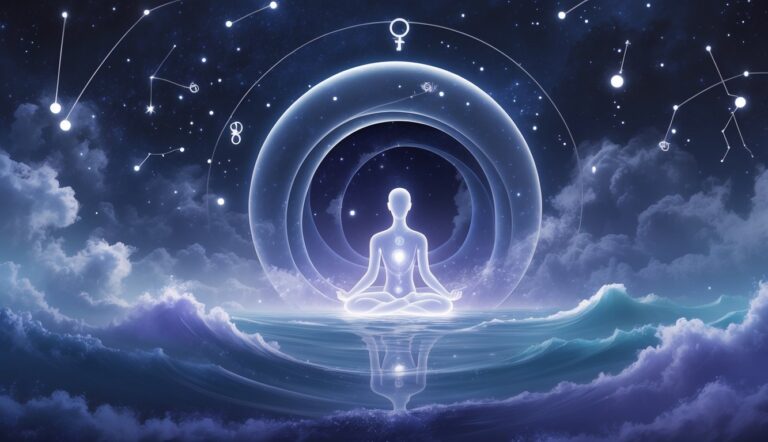Align Your Life with Your True North
The Power Quadrant System decodes your natural talents and pinpoints the career, timing and relationships that let you earn more, love deeper, and wake up eager for the day.
- Uncover your #1 high-income strength
- Draw in partners who raise your energy
- Work when your body’s clock is in “flow”
For millennia, humans have been fascinated by dreams, which offer glimpses into our subconscious minds. Dream interpretation can provide valuable insights into your emotions, fears, and desires. As you explore the meanings behind your nighttime visions, you’ll discover a rich tapestry of symbols and themes unique to your experiences.
Recurring dreams often hold special significance, reflecting unresolved issues or persistent thoughts in your waking life.
Pay attention to these patterns and consider how they might relate to your current circumstances.
By keeping a dream journal and noting the details of your dreams, you’ll be better equipped to uncover their hidden messages.
Remember that dream interpretation is highly personal.
While common symbols exist, their meanings can vary greatly depending on your individual context and associations.
Trust your intuition as you decode your dreams, and don’t be afraid to seek guidance from professionals if you encounter particularly troubling or persistent themes.
Key Takeaways
- Dreams reflect your subconscious thoughts and emotions
- Recurring dreams often signal unresolved issues in your life
- Personal context is crucial for accurate dream interpretation
The Science of Dreams
Dreams have fascinated humans for centuries, leading to various scientific inquiries into their nature and purpose.
Researchers have explored dreams from both psychological and neurological perspectives, uncovering fascinating insights into how your brain functions during sleep.
Psychological Perspectives
Sigmund Freud viewed dreams as a window into your unconscious mind.
He believed that dreams represented repressed desires and unresolved conflicts.
Decode Your Personal Success Blueprint
Power Quadrant System shows you the exact career, relationships, and daily rhythm that match your natural DNA—so you earn more, work happier, and connect deeper.
- Pinpoint your #1 money-making talent
- Erase conflict & attract ideal partners
- Multiply productivity with perfect timing
Carl Jung, on the other hand, saw dreams as a way for your psyche to communicate important messages to your conscious self.
Modern psychologists often take a more nuanced approach.
They suggest that dreams may help you process emotions, consolidate memories, and problem-solve.
Some experts believe dreams serve as a sort of “emotional regulation” system, allowing you to work through complex feelings in a safe, imaginary space.
Dreams can also reflect your daily experiences and concerns.
If you’re anxious about an upcoming event, you might have stress-related dreams.
This connection between waking life and dream content is an active area of research in dream psychology.
Neuroscientific Insights
Brain imaging technologies have revolutionized our understanding of dreams.
During REM sleep, when most vivid dreaming occurs, your brain shows patterns of activity similar to when you’re awake.
Tap Into Your Built-In Success GPS
The Power Quadrant System deciphers your genetic blueprint so you can lock onto the career, income and relationships that feel effortless—and wildly rewarding.
- Zero in on your natural high-earning genius
- Sync with partners who boost your vibe
- Wake up driven, finish days fulfilled
This suggests that dreaming is a complex cognitive process, not just random neural firing.
Key brain regions involved in dreaming include:
- Amygdala (emotion processing)
- Hippocampus (memory formation)
- Visual cortex (image creation)
Scientists have found that disrupting certain brain areas can affect dream content or recall.
This research helps explain why some people rarely remember their dreams, while others have vivid recollections.
Recent studies indicate that dreams might play a role in memory consolidation and learning.
As you sleep, your brain may be replaying and strengthening important memories from the day, potentially improving your ability to retain information.
Common Dream Themes
Dreams often feature recurring themes that many people experience.
These shared scenarios can provide insight into our subconscious minds and emotional states.
Let’s explore some of the most prevalent dream themes and what they may symbolize.
Being Chased
You’re running, heart pounding, as something or someone pursues you.
This common dream theme often reflects feelings of anxiety or avoidance in your waking life.
The entity chasing you might represent a problem you’re trying to escape or a fear you’re unwilling to confront.
What’s chasing you can offer clues about your real-life concerns.
A monster might symbolize a general fear, while a specific person could point to a particular relationship issue.
Pay attention to your surroundings in the dream – they may hint at the source of your anxiety.
Sometimes, being chased isn’t entirely negative.
It can indicate motivation or drive, pushing you towards a goal.
Consider how you feel during and after the dream.
Are you terrified or exhilarated? Your emotional response can reveal much about your current life challenges.
Falling
You’re suddenly plummeting through the air, jolting awake just before impact.
This sensation is one of the most universally experienced dream themes.
Falling dreams often occur when you’re feeling insecure or out of control in your life.
The context of your fall matters.
Are you falling from a great height or just tripping? A long fall might represent a major life change, while a small stumble could signify minor setbacks.
The landing is also significant – a soft landing might suggest trust in your ability to handle challenges.
Falling dreams can be your mind’s way of processing fears of failure or loss of status.
They might occur more frequently during times of stress or when you’re facing important decisions.
Pay attention to these dreams as they could be highlighting areas where you need more support or confidence.
Flying
You’re soaring through the sky, free from earthly constraints.
Flying dreams are often associated with feelings of liberation, power, and achieving your goals.
The ease or difficulty of your flight can reflect your current life outlook.
Smooth flying might indicate confidence and a sense that you’re on the right path.
Struggling to stay airborne could represent obstacles you’re facing or self-doubt.
The scenery below can offer insights too – are you flying over familiar territory or new landscapes?
Flying dreams can be exhilarating, leaving you with a sense of possibility when you wake.
They might occur when you’re feeling particularly creative or have overcome a challenge.
These dreams encourage you to think big and trust in your abilities to rise above problems.
Symbols and Their Meanings
Dream symbols often carry deeper meanings that reflect your subconscious thoughts and emotions.
Common symbols include water, animals, and feeling lost.
These can provide insights into your waking life experiences and inner desires.
Water Imagery
Water in dreams frequently represents your emotional state.
Calm seas or clear lakes may indicate inner peace and contentment.
Turbulent waters could signal emotional turmoil or uncertainty in your life.
Drowning dreams might suggest feeling overwhelmed by circumstances.
Swimming confidently through water could mean you’re navigating challenges well.
Rain in dreams can symbolize cleansing or renewal.
It may indicate you’re ready for a fresh start or to let go of past difficulties.
Frozen water like ice or snow might represent emotional coldness or stagnation.
It could be a sign to thaw out your feelings and open up more.
Encountering Animals
Animals in dreams often embody specific qualities or emotions.
A lion might represent courage or leadership, while a mouse could symbolize timidity or feeling small.
Flying animals like birds or butterflies may indicate freedom or spiritual growth.
Snakes can be complex symbols, potentially representing wisdom, transformation, or hidden threats.
Domesticated animals in dreams might reflect your relationships.
A loyal dog could symbolize a trustworthy friend, while a aloof cat might represent independence.
Wild or aggressive animals could point to untamed aspects of yourself or situations you find threatening.
Taming a wild animal in a dream may suggest gaining control over your impulses.
Lost and Searching
Dreams of being lost often reflect feelings of uncertainty or lack of direction in your waking life.
You might be questioning your path or feeling unsure about important decisions.
Searching for something in a dream can represent unfulfilled desires or goals.
The object you’re looking for may hold clues about what you feel is missing in your life.
Getting lost in familiar places like your hometown could indicate you’re losing touch with your roots or core values.
It might be time to reconnect with what’s truly important to you.
Finding your way after being lost can be a powerful symbol of personal growth and self-discovery.
It may suggest you’re on the right track to overcoming challenges and finding your purpose.
Interpreting Dreams About People
Dreams featuring other people often reflect our relationships, emotions, and personal growth.
These dreams can provide insights into our subconscious thoughts and feelings about those around us.
Family Members
Dreams about family members are common and can reveal your feelings about your relationships.
If you dream of a parent, it might represent authority or guidance in your life.
Siblings in dreams may symbolize aspects of yourself or competition.
A dream about your child could reflect your hopes, fears, or responsibilities as a parent.
Grandparents appearing in dreams might represent wisdom or connection to your heritage.
Pay attention to the emotions and interactions in these dreams.
They can highlight unresolved issues or areas where you seek support from your family.
Celebrities
When celebrities show up in your dreams, they often represent qualities you admire or aspire to have.
A dream about a famous actor might indicate a desire for recognition or creativity in your life.
Musicians in dreams could symbolize self-expression or emotional resonance.
Politicians might represent power dynamics or leadership qualities you’re exploring.
Consider what the celebrity is known for and how that relates to your current situation.
These dreams can reveal goals or aspects of yourself you want to develop.
Unknown Figures
Dreams featuring strangers or unknown people can be intriguing.
These figures often represent unexplored parts of your personality or new opportunities in your life.
A friendly stranger might symbolize a new aspect of yourself you’re discovering.
An intimidating unknown figure could represent fears or challenges you’re facing.
Pay attention to how you interact with these unknown characters.
Your reactions can provide clues about how you approach new situations or aspects of yourself in waking life.
Nightmares and their Significance
Nightmares can be unsettling experiences that leave you feeling shaken upon waking.
They often reflect deep-seated fears, anxieties, or unresolved issues in your life.
Understanding these terrifying dreams can provide valuable insights into your psyche.
Terror in the Night
Nightmares typically involve intense feelings of fear, anxiety, or panic.
You might find yourself being chased, falling, or experiencing other frightening scenarios.
These dreams can stem from stress, trauma, or even certain medications.
Death dreams, while alarming, don’t usually predict actual death.
Instead, they often symbolize significant changes or transitions in your life.
You might be letting go of old habits or facing fears of the unknown.
Pay attention to recurring elements in your nightmares.
They could point to specific issues you need to address in your waking life.
Recurring Nightmares
If you experience the same nightmare repeatedly, it’s your mind’s way of highlighting an unresolved issue.
These dreams can be particularly distressing, but they also offer an opportunity for growth and healing.
Try keeping a dream journal to track patterns in your recurring nightmares.
You might notice connections between your dreams and daily experiences.
This awareness can help you identify and work through underlying concerns.
Consider talking to a therapist if recurring nightmares are significantly impacting your sleep quality.
They can help you develop coping strategies and explore the root causes of your nightmares.
Cultural Perspectives on Dreams
Dreams hold diverse meanings across cultures, shaping how people interpret and value their nocturnal experiences.
Different societies have unique approaches to understanding dreams, influenced by their traditions, beliefs, and worldviews.
Ancient Civilizations
In ancient Egypt, dreams were believed to be messages from the gods.
They used dream dictionaries to interpret symbols and seek guidance.
Meanwhile, dreamers in Mesopotamia visited special temples for divine communication.
Greek and Roman cultures saw dreams as prophetic.
They practiced dream incubation, sleeping in sacred spaces to receive divine wisdom.
Native American tribes viewed dreams as spiritual journeys, often using them for healing and decision-making.
Chinese tradition considered dreams as soul travel.
They believed your spirit could leave your body during sleep to explore other realms.
Ancient Hebrews saw dreams as a way God communicated with prophets and leaders.
Modern Interpretations
In Western societies, Freud’s psychoanalytic approach revolutionized dream analysis.
He viewed dreams as windows into the unconscious mind, revealing hidden desires and conflicts.
Jung later expanded on this, introducing the concept of collective unconscious in dreams.
Many cultures today blend traditional beliefs with modern psychology.
You might consult a dream dictionary or seek professional dream analysis to understand your nighttime visions.
Some view dreams as problem-solving tools or creative inspiration.
Others believe that dreams can offer glimpses into the subconscious, revealing hidden emotions and unresolved conflicts.
In some traditions, people put great faith in prophetic dreams and future events, seeing them as warnings or guidance from a higher power.
Whether grounded in science or spirituality, dream interpretation remains a fascinating and deeply personal practice.
Many people keep dream journals to track recurring symbols and patterns, hoping to uncover deeper insights.
Psychologists and spiritual leaders alike explore dream meanings and interpretations to help individuals navigate their emotions and life choices.
As scientific research and cultural traditions evolve, our understanding of dreams continues to expand, bridging the gap between logic and mysticism.
In some Asian cultures, dreams are still seen as potential omens or messages from ancestors.
Many indigenous communities continue to value dreams for spiritual guidance and healing.
Scientific research now explores dreams’ role in memory consolidation and emotional processing.
You might use dream journaling to gain personal insights or enhance your creativity.
Techniques for Remembering Dreams
Want to recall your dreams more vividly? Try these proven methods to tap into your subconscious mind and enhance dream memory.
Keep a dream journal by your bed.
As soon as you wake up, jot down any fragments you remember.
Even small details can trigger fuller recollection.
Set an intention before sleeping.
Tell yourself “I will remember my dreams tonight” to prime your mind for recall.
Wake up slowly and stay still.
Don’t jump out of bed right away.
Instead, lie quietly and let dream memories surface.
Use a voice recorder if writing feels like too much effort.
Simply describe what you remember out loud.
Try the “Wake Back to Bed” method.
Set an alarm for 5-6 hours after you fall asleep, then go back to bed focusing on your intention to dream.
Draw quick sketches of dream scenes or objects.
Visual cues can unlock more details from your memory.
Talk about your dreams with others.
Describing them out loud helps solidify the memories and may reveal new insights.
Practice regularly.
The more attention you give to remembering dreams, the better you’ll become at it over time.
Practical Steps for Dream Interpretation
Dream interpretation can unlock insights into your subconscious mind.
By following a systematic approach, you can uncover hidden meanings and gain valuable self-knowledge.
Decoding Symbols
Start by identifying key symbols in your dream.
Write down objects, people, and settings that stood out.
Use a dream dictionary as a starting point, but remember that symbols can have personal meanings.
A snake might represent fear for some, but wisdom for others.
Consider the context of each symbol.
A car in your driveway differs from one speeding down a highway.
Look for patterns across multiple dreams.
Recurring symbols often point to important themes in your life.
Don’t overlook small details.
The color of a flower or the weather in your dream can provide crucial clues.
Trust your intuition when interpreting symbols.
Your subconscious often communicates through metaphors unique to your experiences.
Connecting to Emotions
Pay attention to the feelings you experienced during the dream.
Were you anxious, joyful, or confused? These emotions can reveal underlying concerns or desires in your waking life.
Try to relive the dream in your mind.
Notice any physical sensations that arise.
A racing heart or sense of lightness can offer valuable insights.
Write down your emotional reactions to different parts of the dream.
Consider how the dream made you feel upon waking.
Sometimes the lingering emotion is more significant than the dream’s content.
Reflect on any connections between your dream feelings and current life situations.
Applying Interpretations
Look for parallels between your dream and recent events in your life.
Dreams often process experiences from the past few days.
Consider how the dream might be offering a new perspective on a situation.
Ask yourself what advice the dream seems to be giving.
Dreams can highlight areas of your life that need attention.
Take action based on your interpretations.
If a dream suggests you’re neglecting a relationship, reach out to that person.
Keep a dream journal to track patterns over time.
Online dream interpretation tools can offer fresh insights.
Share your dreams with trusted friends or a therapist for additional perspectives.
Remember, the most valuable interpretations are those that resonate with you personally.
When to Seek Professional Help
Dreams can be mysterious and confusing.
While many dreams are harmless, some may indicate deeper issues that require professional assistance.
Consider seeking help if you experience recurring nightmares that disrupt your sleep or daily life.
These could signal unresolved trauma or anxiety.
Vivid, distressing dreams that leave you feeling upset or anxious upon waking may also warrant professional guidance.
A therapist can help you process these emotions and understand their root causes.
If your dreams consistently feature themes of helplessness, being chased, or unable to escape, it might be time to consult an expert.
These could reflect feelings of powerlessness in your waking life.
Dreams involving self-harm or suicide should never be ignored.
Reach out to a mental health professional immediately if you have such dreams, as they may indicate serious underlying issues.
Persistent dreams about past traumas or losses can be a sign that you’re struggling to cope.
A therapist can provide tools to help you process these experiences and move forward.
Dream Interpretation in the Digital Age
The digital age has transformed how you can explore and interpret your dreams.
Online dream dictionaries and interpretation tools are now at your fingertips, offering instant insights into your nighttime visions.
These digital resources provide quick access to symbolic meanings and interpretations.
You can easily look up common dream symbols or themes to gain a better understanding of your subconscious mind.
Many online platforms now use AI to analyze dream patterns and offer personalized interpretations.
These tools consider factors like your emotions, recent experiences, and recurring symbols in your dreams.
Benefits of digital dream interpretation:
- 24/7 accessibility
- Vast databases of dream symbols
- Personalized insights
- Community forums for sharing experiences
While these digital tools are convenient, remember that your personal experiences and emotions play a crucial role in dream interpretation.
Use online resources as a starting point, but trust your intuition when deciphering your dreams’ meanings.
Consider keeping a digital dream journal on your smartphone or tablet.
This allows you to quickly record your dreams upon waking, ensuring you don’t forget important details.
As technology advances, virtual and augmented reality may soon offer immersive dream exploration experiences.
You might be able to visually recreate and interact with elements from your dreams, providing deeper insights into your subconscious mind.
Frequently Asked Questions
Dreams can be mysterious and intriguing, often leaving us with questions about their meanings and significance.
Here are some common inquiries people have about interpreting their dreams and understanding dream symbols.
What does it typically mean when you dream about a specific person?
Dreaming about someone you know often reflects your feelings, thoughts, or concerns about that person in your waking life.
It might represent unresolved issues or highlight certain qualities you associate with them.
Sometimes, the person in your dream symbolizes an aspect of yourself.
Pay attention to their actions and your emotions in the dream for deeper insights.
How can I interpret a dream that I had about the number three?
The number three in dreams can have various meanings.
It often symbolizes balance, creativity, or completion.
In many cultures, three represents a triad or trinity, such as past-present-future or mind-body-spirit.
Consider the context of the dream and your personal associations with the number three.
It might relate to a situation in your life that involves three elements or a decision with three options.
Where can I find reliable interpretations for my dreams?
You can find reliable dream interpretations in books written by respected psychologists or dream experts.
Online dream dictionaries from reputable sources can also be helpful starting points.
Consider joining dream interpretation forums or groups where you can discuss your dreams with others.
Remember, the most accurate interpretations often come from your own intuition and personal experiences.
Is there a universal guide to understanding dream symbols from A to Z?
While many dream dictionaries exist, there’s no truly universal guide to dream symbols.
Symbols can have different meanings based on personal experiences, cultural backgrounds, and individual contexts.
Use dream dictionaries as reference points, but trust your own feelings and associations with the symbols.
Your personal interpretation is often the most relevant and meaningful.
Can dreams hold different meanings in various cultural or religious contexts?
Yes, dream interpretations can vary significantly across cultures and religions.
What’s considered positive in one culture might be seen as negative in another.
For example, dreaming of snakes is often viewed as a warning in Western cultures, while in some Eastern traditions, it might symbolize wisdom or transformation.
Consider your cultural background when interpreting your dreams.
How Can I Determine the Significance of a Recurring Dream?
A recurring dream often highlights unresolved issues or important messages from your subconscious.
Keep a dream journal to track patterns and changes in these dreams over time.
Look for common themes or emotions in your recurring dreams.
Consider what’s happening in your waking life when these dreams occur.
Sometimes, the dream may stop recurring once you’ve addressed the underlying issue or message.










